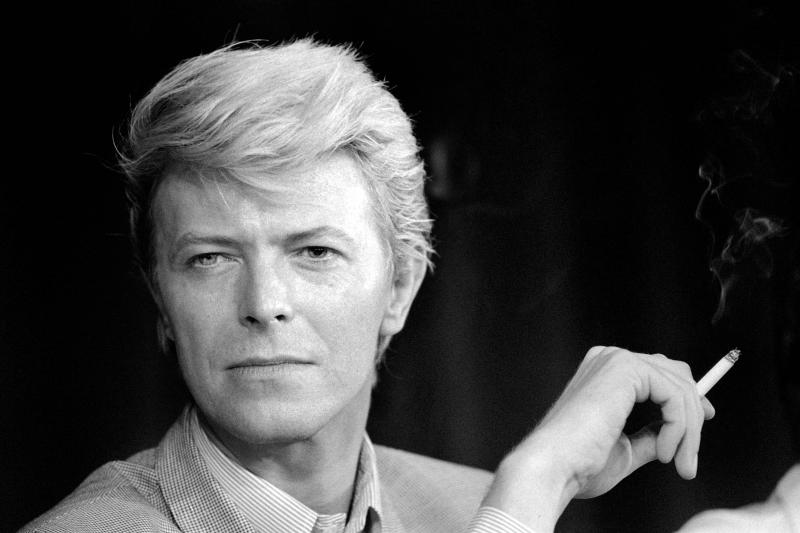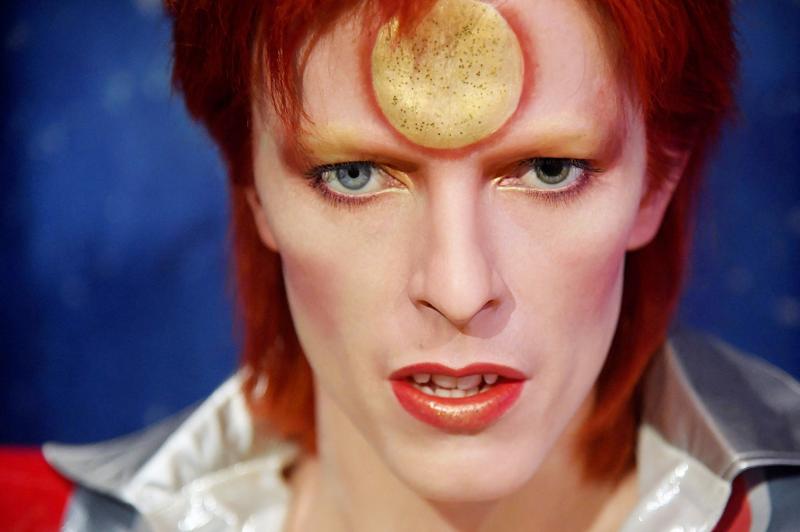It is half a century since Ziggy Stardust — a character that turned David Bowie into an intergalactic star and revolutionized sexual politics in the process — crashed onto Earth. The London singer had spent a decade trying to refine his stage persona, but despite a couple of hits — 1969’s Space Oddity and Changes two years later — he had yet to achieve the stardom he craved.
“He had failed in everything he tried since the beginning of his career,” said Jerome Soligny, one of the world’s leading Bowie experts and author of David Bowie: Rainbowman.
But on June 16, 1972, The Rise and Fall of Ziggy Stardust and the Spiders from Mars finally pulled together all the elements he had been absorbing. There was the dirty rock of Iggy Pop and Lou Reed whom he had met in New York, the mime and theater he had studied in London, boiler suits from A Clockwork Orange and wild, androgynous styles from the underground gay clubs he frequented with his wife.

Photo: AFP
Into the melting pot went Bowie’s memories of veteran rocker Vince Taylor, who had gone off the rails and believed he was an alien god, and his obsession with a Texas country singer known as Legendary Stardust Cowboy.
And out came an alter-ego in Ziggy Stardust — a pan-sexual alien rockstar from outer space who fed a hunger in pop culture for something radical and shocking after too many years of long-haired hippies. “We wanted nothing to do with the sixties,” Bowie later said. “We were determined that we were at the beginning of the 21st century. We wanted to wipe out everything that went before.”
BEAUTIFUL CREATION

Photo: AFP
Crucial to the impact of the album was an interview he gave British music weekly Melody Maker a few months before its release.
“I’m gay and always have been, even when I was David Jones,” he said, resplendent in his red spiky hair, skin-tight jumpsuit and red plastic boots.
It was shocking at the time — the first major celebrity to come out, less than five years after homosexuality was decriminalized in Britain.

Photo: Reuters
Soon, this attitude would make him an icon, providing a psychological lifeline for generations of queer kids and outsiders.
“It was marketing before its time — [that statement] was his most beautiful creation and it allowed him to hatch, to become something more than a well-kept secret among the rock intelligentsia,” Soligny said.
‘PSYCHOLOGICAL DESTRUCTION’
Still, it took a while to catch on.
The shows were a radical change from the norm, with multiple costume changes and a story arc, but barely a dozen people showed up to some of the early Ziggy concerts — and sometimes they were booed off stage.
An appearance in July on the legendary BBC show Top of the Pops, followed by a hugely successful US tour, changed all that. It helped that there was more to Bowie than showmanship and shock value — a sophistication missing from many of his glam-rock peers.
The album remains a bona fide rock classic, packed with hits like Starman, Suffragette City and the title track. Crucially, as Rolling Stone magazine wrote at the time, Bowie “never made his sexuality anything more than a completely natural and integral part of his public self, refusing to lower it to the level of gimmick.”
Very quickly, Bowie became one of the defining artists of his generation.
And just as abruptly, he ended it — announcing at a gig in London in July 1973 that Ziggy was no more.
The success had made it dangerously hard to separate the Ziggy storyline from reality.
“With the help of some chemical substances at the time, it became easier and easier for me to blur the lines between reality and the blessed creature that I created... Then you start on the trail of chaotic psychological destruction,” Bowie later recalled.
Ziggy was dead, but Bowie had set a template for creating characters that he would continue with huge success in the years to come.

April 28 to May 4 During the Japanese colonial era, a city’s “first” high school typically served Japanese students, while Taiwanese attended the “second” high school. Only in Taichung was this reversed. That’s because when Taichung First High School opened its doors on May 1, 1915 to serve Taiwanese students who were previously barred from secondary education, it was the only high school in town. Former principal Hideo Azukisawa threatened to quit when the government in 1922 attempted to transfer the “first” designation to a new local high school for Japanese students, leading to this unusual situation. Prior to the Taichung First

When the South Vietnamese capital of Saigon fell to the North Vietnamese forces 50 years ago this week, it prompted a mass exodus of some 2 million people — hundreds of thousands fleeing perilously on small boats across open water to escape the communist regime. Many ultimately settled in Southern California’s Orange County in an area now known as “Little Saigon,” not far from Marine Corps Base Camp Pendleton, where the first refugees were airlifted upon reaching the US. The diaspora now also has significant populations in Virginia, Texas and Washington state, as well as in countries including France and Australia.

On April 17, Chinese Nationalist Party (KMT) Chairman Eric Chu (朱立倫) launched a bold campaign to revive and revitalize the KMT base by calling for an impromptu rally at the Taipei prosecutor’s offices to protest recent arrests of KMT recall campaigners over allegations of forgery and fraud involving signatures of dead voters. The protest had no time to apply for permits and was illegal, but that played into the sense of opposition grievance at alleged weaponization of the judiciary by the Democratic Progressive Party (DPP) to “annihilate” the opposition parties. Blamed for faltering recall campaigns and faced with a KMT chair

Article 2 of the Additional Articles of the Constitution of the Republic of China (中華民國憲法增修條文) stipulates that upon a vote of no confidence in the premier, the president can dissolve the legislature within 10 days. If the legislature is dissolved, a new legislative election must be held within 60 days, and the legislators’ terms will then be reckoned from that election. Two weeks ago Taipei Mayor Chiang Wan-an (蔣萬安) of the Chinese Nationalist Party (KMT) proposed that the legislature hold a vote of no confidence in the premier and dare the president to dissolve the legislature. The legislature is currently controlled